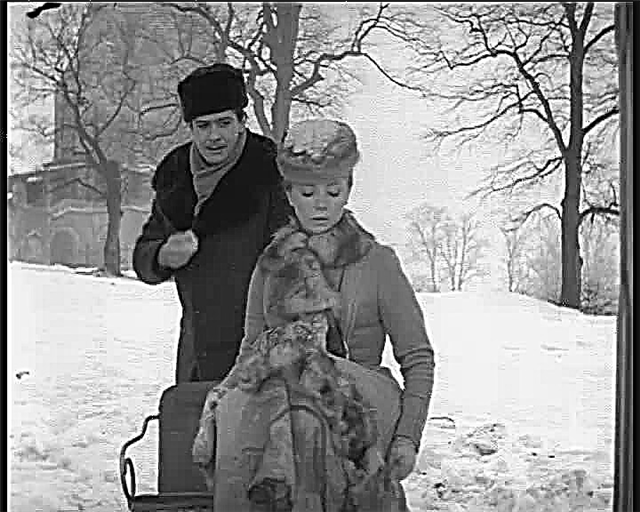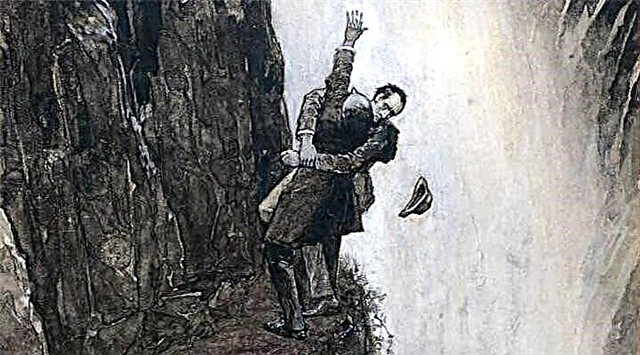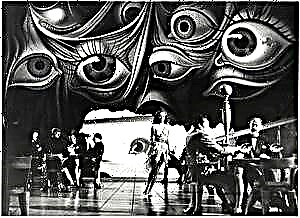At the center of the story are two sisters, Elinor and Marianne Dashwood. The endless ups and downs of their love ("sensitive") experiences and yearnings will make up the plot outline of the novel.
But let's start first and try to figure out the intricate plot moves and family ties of the heroes.
Out of the narrative, a certain gentleman, Mr. Henry Dashwood, a descendant of an old family, the owner of the most beautiful estate Norland Park in Sussex, goes into the world. Mr. Dashwood had a son from his first marriage, John, and his second wife (Mrs. Dashwood will become one of the heroines of the novel) gave him three daughters: Elinor and Marianne, already familiar to us, as well as the younger Margaret, who will not play a big role in the story. But, by the way, beyond the scope of the narrative is also one more owner of Norland Park, another Mr. Dashwood, which “our” Mr. Dashwood is his nephew. So, the elderly Mr. Dashwood, dying, bequeathed the entire estate with the adjacent land not to his nephew, but to his son from his first marriage, already an adult, already having his own son. A year after the uncle’s death, Henry Dashwood, leaving his wife and three daughters without a livelihood, entrusts them with the care of his son John. However, the last will expressed on the deathbed, not being fixed on paper, at all times was a completely doubtful thing and was not binding at all, calculated only on the nobility of those whose hearing it was intended. Mr. John Dashwood did not suffer from excessive nobility, and if “good impulses” were destined for him, then he had a wife, Mrs. John Dashwood (Fanny), to extinguish these impulses in time. Fanny quickly managed to convince her husband that it would certainly be better if he did not provide any support to his sisters and stepmother. And as a result, Mrs. Dashwood and her daughters were forced to leave the house in which they had happily lived for so many years, since she was offered a shelter by a wealthy relative, a certain Sir John Middleton, who lived in Devonshire. This shelter was a charming house on his estate in Barton Park, and soon the ladies departed to their new penates, taking with them all the utensils, including old china and silver, the loss of which still pained the heart of the younger Mrs. Dashwood, who remained 'the sovereign mistress of Norland Park: this time the last will of the late Mr. Dashwood was not in her favor. Between Edward Ferrars, brother of Mrs. John Dashwood, a rather weak-willed man, who is nice, as they say, harmless, and Elinor feels, but their marriage is impossible for the same reason: Elinor is a dowager. And the main, implacable opponent of their marriage is the mother of Edward Mrs. Ferrars.
So, our heroines arrive at the Barton Cottage, and they still do not have time to properly settle in their new home, as the fateful meeting takes place, incredibly romantic: on a walk in the woods Marianne, tripping over a snag, tucks her leg - and then, from nowhere take a young gentleman, he jumps off the horse and takes Marianne into the house. Passion flares between him and Marianne from the first meeting. But I must say that before that, Marianne was able to turn her head ("reluctantly crazy") to another quite worthy gentleman. His name is Colonel Brandon. A person who has a secret in the past (which will be revealed later: also fatal love), as a result of which he is constantly in melancholy, silent and sad. And besides, it’s incredibly old: he is already thirty-five, and Marianne with anger and contempt tells her sister that “in his year” it is time to forget about love and marriage. In general, Marianne, in a duet with Elinor, is the personification of an unruly, unbridled feeling, and her sister is the mind, the ability to "rule over herself." So, Marianne and Willoughby spend their days together without parting, partly, probably, violating secular decency - however, this is still a province, and the conventions here, in the lap of nature, are observed a little less strictly. However, everyone in the district considers them to be the bride and groom, and marriage is their business. Marianna herself does not doubt it. However, one fine day (or rather, morning), Willoughby suddenly appears in their house with a farewell visit: he is leaving. His coldness and estrangement, and most importantly, complete uncertainty about his return - all this stuns the inhabitants of Barton Cottage. Marianne, from grief, just goes crazy, not knowing how to hide her despair and broken heart.
At some point, two more young ladies appeared in Barton Park - the Steele sisters, one of whom, Lucy, shyly (or rather, shamelessly) lowering her eyes, with feigned modesty, knowing, undoubtedly, about the feeling connecting Elinor and Edward Ferrars , it is her, Elinor, who believes her “terrible secret”: it turns out that several years ago she and Edward secretly got engaged, and, for the same reason, mother Edward, the formidable Mrs. Ferrara, became an obstacle to their marriage. Eleanor stoically listens to the revelations that an unexpected rival rains down on her, however, between the two girls there immediately arises a mutual hostility, poorly hidden by equally mutual courtesies.
And another character appears in the novel: Mrs. Jennings, mother of Lady Middleton, “a lady of a very pleasant, lively character <...> a good-natured cheerful woman, already years old, very talkative <...> and rather vulgar”. It’s a kind of “Barton gossip”, the meaning of which life (and the only thing) is the desire to marry everyone. And since she already married both her daughters quite successfully, now she is busy with the device of happiness of the surrounding young ladies. Perhaps, as a result of this, seeing Marianne's broken heart, she offers her and her sister to stay in her London house. So the Dashwood sisters get to the capital. Their regular guest is Colonel Brandon, who bitterly observes the suffering of Marianne, who is so indifferent to him. However, it soon becomes clear that Willoughby is also in London. Marianne sends him - secretly from her sister - a few letters, receiving nothing in return. Then chance brings them to the ball, and Willoughby is again cold, courteous and far: after saying a few meaningless words, he moves away from Marianne to his young companion. Marianne again unable to hide her confusion and despair. The next day a letter arrives from Willoughby, utterly courteous and therefore even more offensive. He returns to Marianne her letters and even a lock of gift presented to him. Colonel Brandon, who appeared, reveals to Elinor the “true face” of Willoughby: it turns out that it was he who seduced (and then, with the child in his arms, threw) the young pupil of Colonel Eliza (the illegitimate daughter of that very “first love” of the colonel, whose history at that moment he and poses by Elinor). As a result, Willoughby marries “by calculation” on the rich heiress of Miss Gray.
After this news, events in Marianne’s life pass into a purely “emotional” (“sensitive”) plan, and in terms of plot movement, the center of gravity is transferred to Elinor’s fate.
And everything is connected with Edward Ferrars. Accidentally encountering his brother John in a jewelry store, Eleanor and Marianne begin to visit his house in Harley Street, where Elinor meets Lucy Steele again. But self-confidence at one point almost ruined this young lady: Fanny Dashwood and Mrs. Ferrara learn about her secret engagement with Edward, after which Lucy is shamefully driven out of the house where she and her sister just received an invitation to stay, and Edward, in his turn, the mother loses inheritance. But, "as an honest man," now he is about to fulfill this once-oath, combined with the "unfortunate Lucy" legal marriage. Colonel Brandon (embodied nobility and disinterestedness: without further ado, to the utter bewilderment of others, he simply gives a helping hand to the afflicted) offers the surviving Edward to come to his estate in Delaford. And Elinor asks to fulfill this delicate mission: to inform Edward (with whom the colonel is unfamiliar) about his proposal. The colonel does not realize that Eleanor has long loved Edward, and therefore does not understand what kind of pain this conversation will cause her. However, faithful to duty, Elinor fulfills the assignment given to her and, confident that now her dream of marriage with Edward has finally come to an end, leaves her sister with her sister. On their way home, to their mother, whom they had not seen for so long, they stop in Cleveland at Mrs. Jennings. Suddenly, Marianne is seriously ill, she is unconscious, her life is in danger. Elinor turns into a nurse, caring and faithful. On the day when Marianne is finally getting better, the crisis is over, Elinor, tired, sitting alone in the living room, hears a stroller approaching the house. Assuming that this is Colonel Brandon, she goes into the hallway, but sees the one entering the house ... Willoughby.
Madly excited, he asks from the doorway about the health of Marianne and, only having learned that her life is in danger, finally takes a breath. “I want to offer some explanations, some justifications for what happened; open my heart to you and, convincing you that although I could never boast of prudence, I was not always a scoundrel, to get a shadow of forgiveness from Ma ... from your sister. ” He reveals his secrets to Elinor - not too, frankly, interesting, he pours out his "suffering soul" to her and, romantic, disappointed, leaves, leaving Elinor "in the grip of many thoughts, although contradictory, but equally sad <...> Willoughby , contrary to all his vices, aroused sympathy, for they condemned him to suffering, which now, when he was forever torn away from their family, forced her to think of him with fondness, with regret, correlated <...> more with what he wanted he himself, than with what he deserved. "
A few days later, walking with Marianne around Barton Park, where they had first met Willoughby, Elinor finally decided to tell Marianne about his night visit and an unexpected confession. Marianne’s “clear mind and common sense” this time prevail over “feeling and sensitivity,” and Elinor’s story only helps her put an end to her sighs about unfulfilled happiness. Yes, however, both already have no time to sigh, for the action of the novel irresistibly strives for a denouement. Happy, of course. For Elinor, this is a marriage with Edward Ferrars: Lucy Steele, unexpectedly for both of them, freed him from the “obligations of honor” that he falsely understood by jumping out to marry his younger brother Edward Robert. Marianne, however, some time after her sister’s wedding, having humbled pride, becomes Colonel Brandon’s wife. In the final, everyone forgives everyone, everyone reconciles with everyone and remains “to live happily ever after.”












